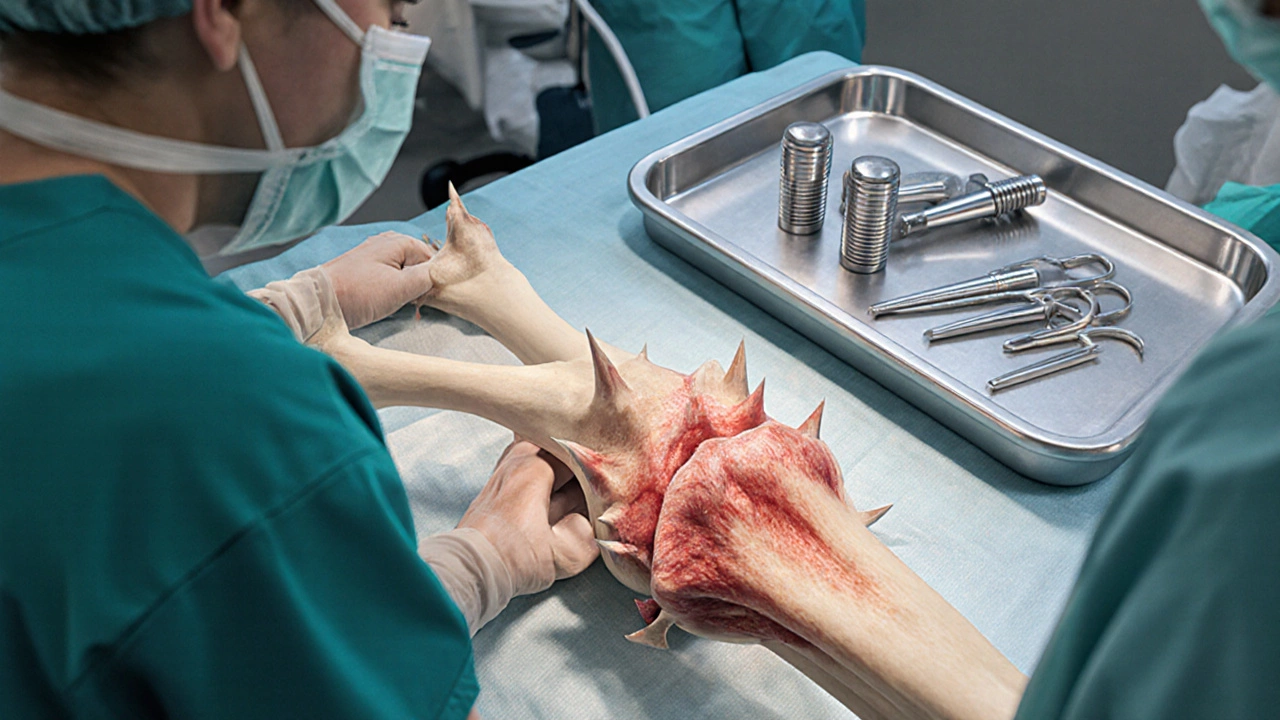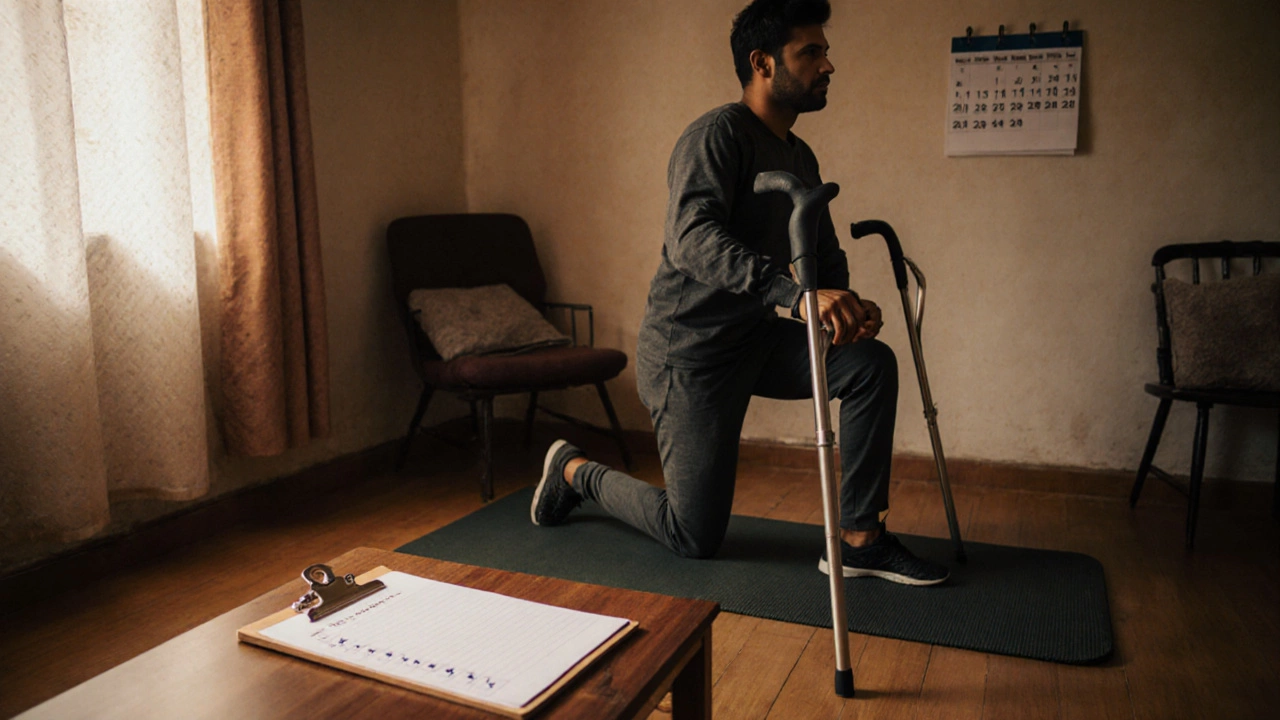
Imagine living with a knee that creaks every step, swells after a short walk, and keeps you from playing with your kids or getting to work on time. It’s a scenario many face while waiting for a scheduled knee operation. The ticking clock isn’t just an inconvenience-it can actually change the condition of your joint and the outcome of the surgery.
Knee replacement surgery is a surgical procedure that swaps damaged bone and cartilage with artificial implants, restoring function and easing pain caused by severe arthritis. When the decision to operate is postponed for months-or even years-the joint’s internal environment can deteriorate, turning a manageable case into a complex medical challenge.
Why the Knee Deteriorates Over Time
Osteoarthritis is the most common reason doctors recommend knee replacement. It’s a progressive loss of cartilage, the smooth cushion that allows bones to glide. As cartilage thins, bone-on-bone contact spikes, triggering three key processes that worsen with time:
- Cartilage degradation - The protective layer erodes, exposing raw bone.
- Joint inflammation - The body’s immune response sends fluid and immune cells into the joint, causing swelling and pain.
- Bone remodeling - The bone tries to adapt, forming spurs (osteophytes) that further limit motion.
Each of these steps fuels the next, creating a feedback loop that accelerates damage. Waiting too long lets this loop run unchecked.
Key Risks of Waiting Too Long
Below are the most common ways a prolonged wait can affect you.
- Escalating pain and loss of independence - Pain intensity often follows a linear path, but quality‑of‑life drops sharply once daily tasks become impossible.
- Irreversible joint damage - Osteophytes can grow into surrounding tissue, making later surgery harder to perform.
- Longer, more complex operations - Surgeons may need to remove larger bone fragments or perform additional bone grafts, extending anesthesia time by 20‑30 minutes on average.
- Higher infection risk - Prolonged swelling and poor skin integrity raise the chance of post‑operative infection by up to 1.5‑fold (source: 2023 Orthopedic Infection Registry).
- Increased implant wear - When bone quality declines, the new implant bears uneven loads, shortening its lifespan.
- Compromised rehabilitation - Stiffness that sets in pre‑surgery often carries over, meaning patients may need 30‑40% more physiotherapy sessions.
All these factors combine into what clinicians call delayed knee surgery complications, a phrase that captures the cumulative impact of postponement.
What the Numbers Say
| Complication | Early Surgery (<6 months after recommendation) | Delayed Surgery (>12 months) |
|---|---|---|
| Pain persistence after 6 months | 15% | 38% |
| Post‑operative infection | 0.8% | 1.3% |
| Implant revision within 5 years | 4% | 9% |
| Extended physiotherapy (>12 weeks) | 22% | 45% |
These figures come from the National Joint Registry’s 2024 annual report and illustrate a clear trend: the longer you wait, the more likely you’ll face setbacks.

Who Shouldn’t Wait
Not every patient can afford a quick operation, but certain red flags demand faster action:
- Rapid loss of knee flexion (less than 90°).
- Visible deformation or severe valgus/varus alignment.
- Recurrent swelling that doesn’t respond to physiotherapy.
- Systemic conditions such as uncontrolled diabetes that already raise infection risk.
- Age under 60 with high activity levels-delaying may force a second revision sooner.
If any of these apply, discuss an accelerated surgery slot with your orthopedic surgeon.
Managing the Wait: Proven Strategies
When surgery can’t be booked right away, these evidence‑based measures can slow the damage.
- Physical therapy - Targeted quadriceps strengthening reduces load on the joint by up to 30% (Study, JAMA 2022).
- Weight management - Each kilogram lost decreases knee‑joint force by about 4 kg.
- NSAIDs or topical diclofenac - Use as directed to control inflammation; avoid long‑term oral steroids which can weaken bone.
- Viscosupplementation - Hyaluronic acid injections can provide temporary lubrication, buying you weeks of relief.
- Assistive devices - A well‑fitted cane or knee brace offloads pressure and improves gait stability.
These steps won’t replace surgery, but they buy time and often improve the eventual outcome.

Signs It’s Time to Push for an Earlier Date
Even with best‑in‑class management, the knee can reach a tipping point. Look out for:
- Uncontrolled pain that wakes you at night.
- Sudden loss of walking distance (e.g., can’t walk 100 m without rest).
- New episodes of knee locking or giving way.
- Visible swelling that doesn’t subside after rest.
When these appear, call your surgeon’s office and request an earlier slot. In many hospitals, a “clinical urgency” request can move you forward by weeks.
Quick Checklist Before Your Surgery
- Confirm the recommended surgery date and reason for any delay.
- Review your latest imaging-X‑ray or MRI-to see if joint damage has progressed.
- Discuss any new medical conditions (e.g., blood pressure, diabetes) with your surgeon.
- Start a pre‑hab program: quad sets, straight‑leg raises, and low‑impact cardio.
- Arrange post‑operative support: family, physiotherapist, transport.
Having these items ready can shorten the pre‑operative waiting period and improve post‑surgery recovery.
Frequently Asked Questions
How long can I safely wait for a knee replacement?
Most orthopedists suggest surgery within 6‑12 months of a formal recommendation, especially if pain limits daily activities. Waiting beyond a year raises the odds of complications, as the data above shows.
Will my knee get worse while I wait?
Yes. Osteoarthritis is progressive. Without surgical intervention, cartilage loss, bone spurs, and inflammation typically advance, making the joint harder to restore later.
Can physical therapy replace the need for surgery?
Physical therapy can delay surgery and improve strength, but it won’t regenerate lost cartilage. When pain and function no longer respond to conservative care, surgery becomes the definitive option.
What are the most common complications if I wait too long?
Higher rates of persistent pain, post‑operative infection, implant wear, and the need for extended rehabilitation are the main concerns linked to delayed surgery.
Is there a way to speed up my surgery appointment?
Yes. Notify your surgeon of any worsening symptoms, request a “clinical urgency” note, or consider private clinics that may have shorter waitlists.

Write a comment